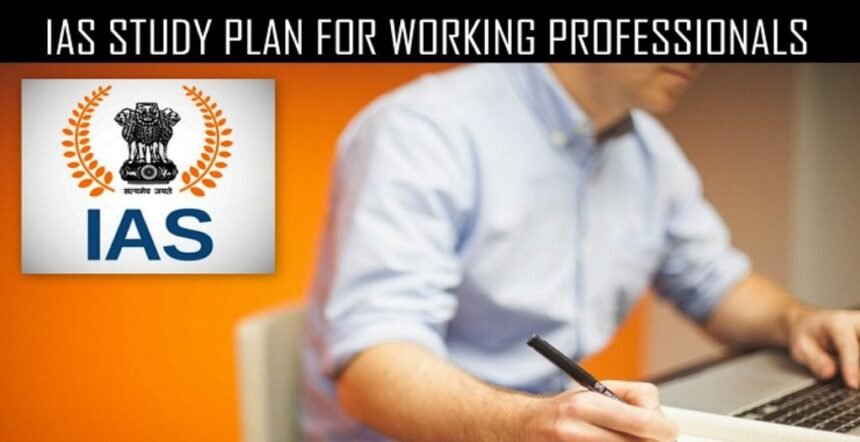In India, being a civil servant is a common goal for graduates. While some
people work while studying for the exam, others devote their entire time to
UPSC preparation. In this post, we’ll look at some UPSC preparation tips
for working professionals.
First, we will see the problems faced by working professionals during the
preparation of UPSC:
Problems Faced by UPSC Aspirants
Very Less Time
Time is the most evident limitation for a working professional and is actually the main deterrent for many. It’s impossible to deny the reality that a
working professional is more time-constrained than an aspirant who is not
employed and has unrestricted time for preparation.
Exhaustion
Due to their daily drive to work, long workdays managing multiple tasks,
and people’s expectations at work and home, working professionals find it
difficult to maintain the energy and attention needed for UPSC.
Other Problems
There are other problems that include commitments to one’s family, to
society, and one’s career. All of these things will continue to be a part of
your life, but the challenge is to overcome them for an unbeatable result
that can alter the trajectory of your life.
At first glance, it could appear impossible to balance work responsibilities
and exam preparations simultaneously, but effective planning, time
management skills, expert coaching, and perseverance can make a world
of difference. Here are a few strategies for solving these issues:-
UPSC Preparation Tips for Working Professionals1. A Benefit in Disguise
Having little time as Working people confine their preparations to a single
or limited source because they have a limited amount of time, in contrast to many aspirants who tend to consult numerous resources without success.
Because they read too much, many individuals also fail to reach the top.
For better preparation in a limited time, aspirants can join UPSC coaching. These coaching institutes have expert faculty members who can guide the
students in the right direction. The Thought Tree is one such institute that
provides separate classes for working professionals.
- Job Security
Working people are more concentrated when studying and more confident
to take on the challenge of the UPSC since they do not worry about
supporting themselves financially, backup plans, time flying by, and all
those problems. - More Confident
A working professional has greater self-confidence than their peers.
Naturally, this occurs as a result of exposure to the working world and work experience. - Financial Support
Working professionals are not under any financial obligation to manage
their income and expenses simultaneously. They can also spend money on IAS coaching, which many students consider to be an extravagance. Any
working professional can succeed in the UPSC exam with effort, time
management, a defined plan, adequate preparation, and assistance. - Experience
Due to their working experiences, their demonstrated aptitude, innate drive to work hard, and meticulous study style lead to greater time management
and resource efficiency. - Never Quit Your Job
Many working professionals who desire to pass the Civil Services Exam
are confused between leaving their jobs and continuing to study. Striking a
delicate balance between idealism and pragmatism would be the solution
to this. Before the Prelims exam, take a few breaks. After passing the
preliminary exam, take a vacation from your job to concentrate entirely on
the Mains exam. Then, once the Mains exam has been written, return to
work. Also, the UPSC interview panel favors aspirants with job experience due to their utmost concentration and time management abilities. - When To Start
At least 9 to 10 months prior to Prelims is the optimal time to begin
studying. The emphasis should be on laying a solid basis now, particularly
in the optional subject and the essential topics like history, economics, and
polity. The studies for the first six months should be done considering both
the Prelims and Mains in mind because a significant portion of the UPSC
syllabus is covered itself while preparing for the mains. - Dedication
A candidate must regularly dedicate at least 5–6 hours to studying. An
aspirant for the UPSC must practice the optional subject, current affairs,
and general studies. Due to a lack of time, a working aspirant shouldn’t
compromise on any of these essential areas. They must organize their
plans, so preparation doesn’t stop even on busy days. The ultimate solution would be to divide the study time into schedules for before, during, after,
and revision. - Stay Away From Social Media
A psychologist who passed the CSE exam offers the following advice:
Social media has significant subconscious effects. Set strict time limits if
you participate in these activities due to your employment or other practical considerations. Try to use these social media apps appropriately to obtain
information. For example, you can utilize YouTube to learn how to ace
UPSC interviews and how to read the newspaper for the UPSC, etc.
Additionally, kindly refrain from making pointless comments in the forum
discussions or discussing comments






